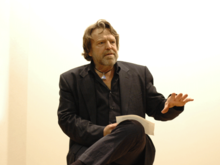網絡獨立宣言
《網路獨立宣言》(英語:A Declaration of the Independence of Cyberspace)是發表在早期互聯網上的一篇文章,主要討論了政府在快速發展的互聯網時代對互聯網的管控問題。受開創性的互聯網項目「網路空間24小時」的委託,這份宣言由電子前哨基金會的創始人約翰·佩里·巴洛撰寫,並於1996年2月8日發表到網絡上。[1]它主要是為了回應1996年在美國通過的1996年美國電信法。2014年,記錄部錄製並發佈了巴洛閱讀宣言的音訊和影片。[2][3]

內容
編輯| “ | 工業世界的政府們,你們這些令人生厭的鐵血巨人們,我來自網絡世界——一個嶄新的心靈家園。作為未來的代言人,我代表未來,要求過去的你們別管我們。在我們這裏,你們並不受歡迎。在我們聚集的地方,你們沒有主權。 | ” |
| ——約翰·佩里·巴洛,《網絡獨立宣言》 | ||
此宣言強調,政府無法也不能統治互聯網,政府對於網絡空間沒有主權。該宣言對互聯網的外部力量如政府(特別是美國政府)進行了反駁。它指出,美國沒有得到被監管者的同意,將法律適用於互聯網,但互聯網不屬於任何的國家。相反,互聯網正在制定自己的社會契約,以確定如何根據黃金法則處理其問題。該文件不僅提到了「電信法」,它還指責中國、德國、法國、俄羅斯、新加坡和意大利扼殺了互聯網[4]。
背景
編輯在撰寫宣言之前,巴洛已經多次就互聯網及其社會與法律的現象撰寫了許多文章[5],1994年3月在《連線》雜誌上發表了他著名的作品《經濟學思想》[6]。
評價
編輯巴洛的宣言迅速成名,並在互聯網上廣泛傳播。在發表後的三個月內,約有5,000個網站轉載了此宣言[7]。在發表後九個月,約有40,000個轉載[8]。為了接近巴洛的自治互聯網的願景,由芝加哥肯特法學院主辦的網絡空間法研究所設立了一名虛擬法官。相關機構和其他法律團體將任命法官解決網上糾紛[7]。該聲明因內部不一致而受到批評[9]。此宣言中稱「『網絡空間』是一個從物理世界中移除的地方」的說法也受到了挑戰,事實上互聯網始終與其依賴的現實事物相關聯[10]。
在互聯網之外,對此宣言回應顯得不那麼積極。美國商務部助理部長拉里·艾榮(Larry Irving)表示,缺乏保障措施將「減緩對消費者和企業產生重大利益的可能的增長」[7]。在雜誌《熱線》中,一位專欄作家稱他的文章只是「胡言亂語(hogwash)」[11]。
在2002年,轉載此宣言的網站數量大約已降至20,000個[12]。2004年,巴洛反思了他20世紀90年代所做出的工作,特別是他當時所持有的樂觀主義態度。他說:「我們都變老了,變得更明智了」[13]。
隨着互聯網的發展,他的宣言受到了越來越多的人的質疑。在2016年,即網絡空間獨立宣言發表20周年的時候,巴洛仍堅持認為「網絡空間是一種獨立於物理世界的東西,與身心完全相同」(英語:Cyberspace is something that happens independently of the physical world in exactly the same way as the mind and body,)[14]。
參見
編輯參考資料
編輯- ^ John Perry Barlow: Is Cyberspace Still Anti-Sovereign?. 2018-02-12 [2019-01-27]. (原始內容存檔於2018-02-10).
- ^ Department of Records. www.departmentofrecords.co. [2019-01-27]. (原始內容存檔於2017-07-04).
- ^ Limited edition vinyl: John Perry Barlow reads "A Declaration of the Independence of Cyberspace" / Boing Boing. boingboing.net. [2019-01-27]. (原始內容存檔於2015-02-24).
- ^ Barlow, John Perry. A Declaration of the Independence of Cyberspace. 1996-02-08 [2017-02-23]. (原始內容存檔於2017-09-24).
- ^ Ley, Michael. DBLP: John Perry Barlow. [2007-02-09]. (原始內容存檔於2007-02-25).
- ^ Barlow, John Perry. The Economy of Ideas. Wired. 1994-03-01 [2020-08-07]. ISSN 1059-1028. (原始內容存檔於2021-05-01).
- ^ 7.0 7.1 7.2 Yang, Catherine. Law Creeps Onto the Lawless Net. BusinessWeek. 1996-05-06, (3474): 58–64 [2007-02-08]. (原始內容存檔於2006-12-07).
- ^ Frezza, Bill. Can Public Network Computing Save Democracy. Network Computing. 1996-11-01: 35.
- ^ Evans, Woody. Cyberspace is the Child of the Industrial Age - Defining it as Independent is Nonsense. Institute for Ethics and Emerging Technologies. 2016 [2019-01-27]. (原始內容存檔於2016-11-05).
- ^ Graham, Mark. Geography/internet: ethereal alternate dimensions of cyberspace or grounded augmented realities?. The Geographical Journal. 2013-03-01, 179 (2): 177–182. ISSN 0016-7398. doi:10.1111/geoj.12009 (英語).
- ^ Cembalest, Robin. The Featherman File. Forward. 1996-09-20, C: 2.
- ^ Barlow, John Perry. John Perry Barlow Declaration for Defendants in MGM et al. v. Grokster et al.. 2002-01-22 [2007-02-09]. (原始內容存檔於10 February 2007).
- ^ Doherty, Brian. John Perry Barlow 2.0: The Thomas Jefferson of cyberspace reinvents his body — and his politics. Reason. August–September 2004 [2019-01-27]. (原始內容存檔於2009-09-03).
- ^ Greenberg, Andy. It’s been 20 years since John Perry Barlow declared cyberspace independence. Wired. 2016-02-08 [2019-01-27]. ISSN 1059-1028. (原始內容存檔於2018-10-02).